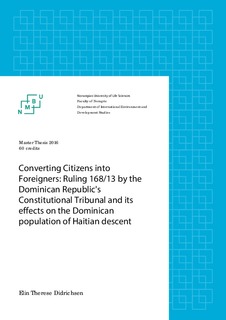| dc.description.abstract | This thesis focuses on Ruling 168/13 by the Dominican Constitutional Tribunal. The ruling denies citizenship to children born to irregular migrants in the Dominican Republic, and allows for the retroactive revocation of Dominican citizenship back to 1929, accordingly affecting people from families who have been in the Dominican Republic for decades. The vast majority of them are of Haitian descent. The objective of this thesis is twofold: First, this thesis uses the concept of anti-Haitianism to place Ruling 168/13 in a wider historical context by looking at conditions and developments in the Dominican Republic leading up to the ruling; the rationalities underpinning it. Second, this thesis explores how Ruling 168/13 affects the Dominican population of Haitian descent that the ruling concerns, both in a broad perspective focusing on the implications on the affected population as a whole, and in more specific terms exploring the effects on the lives of individuals. The thesis is based on a qualitative approach, and uses a combination of qualitative methods and data triangulation, relying on both a variety of existing literature and data from qualitative interviews for the analysis. Michel Foucault’s notion of power; governmentality and bio-politics, is applied as theoretical framework. This research argues that anti-Haitianism has played a significant part in shaping the current way of governing Haitians and their descendants in Dominican society. Dominican state authorities have, through a series of administrative, legislative and judicial decisions the last decade, steadily institutionalized efforts aimed at restricting children of Haitian migrants to access identity documents and ultimately Dominican citizenship. This has enabled the 2013 ruling, which draws on these legal foundations. The thesis also shows how the Dominican state, with Ruling 168/13, has managed to convert Dominican nationals of Haitian descent into foreigners, into migrants who need to be regularized, and who are being segregated from and denied the same rights as other Dominicans. The affected population is excluded from all activities that require official identification, such as working in the formal sector, attending school, accessing health services and so on. For many, it means being excluded from the only society that they have ever known. | nb_NO |
